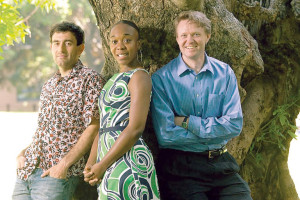International Professional Partnerships for Sierra Leone (IPPSL) brings skilled, cross-culturally experienced professionals from various countries to work in the government of Sierra Leone under the direction of public officials and assist in Sierra Leone’s hopeful renaissance.
As published in the Berkeley Law Transcript
Spring 2009
by Andrew Cohen
Observers were surprised in September 2007 when Ernest Bai Koroma — the newly-elected president of Sierra Leone — appointed human rights activist Zainab Bangura as the small West African country’s Minister of Foreign Afairs. Some saw this as a first step in the political reform candidate Koroma had promised for one of the world’s least developed and most troubled nations. With one-third of educated Sierra Leoneans living abroad, Bangura contacted foreign colleagues to help bring international professionals to assist understaffed government ministries.
Among them were attorney Peter Maybarduk ’07, who had lived in Sierra Leone as the son of an American diplomat, and Boalt lecturer Jamie O’Connell, who had directed the University of Sierra Leone’s Human Rights Clinic. The two, plus Sierra Leonean and American partners, are developing a fellowship program to recruit talented individuals with cross-cultural experience.
“I knew Jamie from taking his Transitional Justice class a few years ago. he class spent a week on Sierra Leone, which of course had especially personal meaning for both of us.” says Maybarduk. “We’ve examined potential frameworks and pitfalls for this kind of program, and reached out to people who could help us make it work.”
Last year, they entered a proposal outlining a broad afiliation between Sierra Leone and UC Berkeley in the Big Ideas at Berkeley’s “Partnerships for Social Innovation” competition. It won a second-place prize of $6,000, enabling Maybarduk and graduating senior Ian Mountjoy to spend July 2008 in Freetown, Sierra Leone’s capital. There, they met with government officials, civil society professionals, and United Nations staff to pinpoint administrative needs, assess logistical issues, and determine the best structure for the program.
“Peter and Ian used the trip to Sierra Leone to get a deep understanding of the current situation there and build relationships that are proving critical to turning this program from a great idea into a real contribution to reform,” says O’Connell.
Government officials identified law, public policy, health, education, engineering, information technology, and accounting as areas of need.
Boalt participants may help with such tasks as drafting legal documents, promulgating regulations, and assisting in the development of policy proposals. Boalt has played a key role in launching the program.
“Thanks to support from Dean Edley and the Miller Institute, the first fellows will arrive in Freetown in early fall,” Maybarduk says. “their vote of confidence is proving invaluable as we seek additional resources to send more fellows.”
Fellows will be selected for their diligence, self motivation, analytical skills, experience working across cultural or national boundaries, and temperament. Ideally, they’ll have worked in resource poor settings. Asa Solway ’09 joins the Ministry of Foreign Afairs this fall, with Kiywhanna Kellup ’09 and others expected to soon follow.
“We’re also looking for a healthy dose of humility,” says O’Connell. Fellows will learn about Sierra Leone’s culture and institutions, and be sensitive to their status as foreigners assisting a sovereign government. “You learn a bit about how to design institutions and legal processes in law school, but it’s far harder to help change real systems of governance, which are always bewilderingly complicated and deeply entrenched.”
While stability has returned to Sierra Leone following its brutal civil war of 1991 to 2002, colossal challenges remain. Maybarduk recognizes their magnitude, but believes an infusion of professional talent can make a contribution as one component of a broad effort to help the country surge forward. “One of the great things about a program like this is that it tends to attract exactly the sort of person you need,” he says. “Minister Bangura and our other partners in the Sierra Leonean government have asked us to recruit exceptional people, and that’s exactly what we’re doing.”


